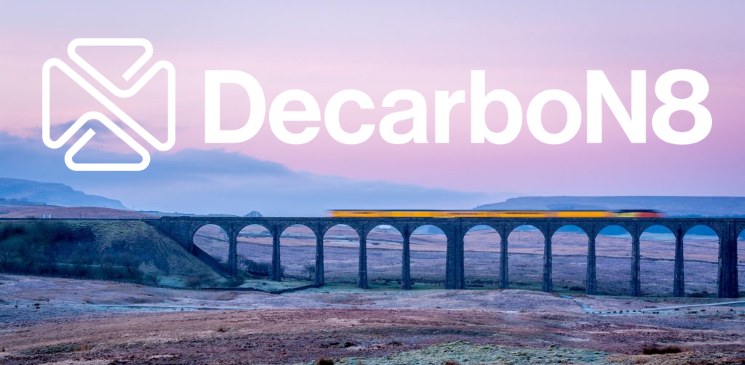
A new research network of northern universities exploring new ways to rapidly decarbonise UK transport has been formally launched.
The DecarboN8 network is focusing on tackling surface transport emissions, which form 26% of the UK’s greenhouse gas emissions. These include emissions from transport vehicles such as cars, vans, buses, heavy goods vehicles and trains. They will also examine emissions from the construction and maintenance of these vehicles and infrastructure. The network, worth £1.25m and funded by the EPSRC, brings together experts from the N8 Research Partnership, as well as experts from Government, industry and the third sector.
The aim of the network is to create an innovation ecosystem and test bed environment which allows the trialling and acceleration of the adoption of low carbon transport solutions, in particular, looking to take a place-based approach recognising that different solutions might be needed for different types of area. The project will also include research into societal acceptance and societal readiness, ensuring that is considered from the start of the research.
At the launch event in Leeds, Professor Greg Marsden, DecarboN8 network lead (based at the Institute for Transport Studies, University of Leeds) said: “There is a massive challenge to try and reduce carbon emissions from transport, not by 2050, but every year from now until 2050 and we simply haven’t been making any progress, so this is a real opportunity to try and say what are we going to do, and how can we do it best in the North.
“We don’t know that it is possible – we have never set out with this level of ambition of change. We know there are some options that could work, we don’t know whether they will work quickly enough and we don’t know whether society and decision makers and businesses are really bought into what this level of ambition really looks like. That’s all part of the programme – it’s not just a case of technological fixes, but it’s about how you can take society with you.”
Lucy Jacques, senior evidence and analysis officer, Transport for the North, also spoke at the launch and told delegates that the DecarboN8 network is very important to what Transport for the North is trying to do. She said: “The fact that a lot of partners have declared climate emergencies across the North is hugely significant and is systematic of the fact that transport investment in decarbonisation and policies to support that have not been sufficient to date.
“Clearly we need to do a lot of work to improve that and utilise Transport for the North as a pan-regional body to drive that forward. DecarboN8, hopefully, will provide us with some of the answers that we need in terms of the scale of change over time; what future technologies might be needed to support implementation and delivery; and what behavioural change is needed, so that we are really hoping that the network can support us in helping unpick this very complex area.”
The 150 delegates, from a whole range of organisations and sectors and disciplines, including local authorities, also heard panel debates on Societal Readiness featuring:
- Monika Büscher, Lancaster University
- Anthony Rae, Cutting Carbon Now
- Emma Moody, Lake District National Park
- Josey Wardle, Zero Carbon Futures
- Ian Palmer, Transport for Greater Manchester
Plus Carbon Ambition for the North, featuring:
- Kevin Anderson, University of Manchester
- Ewa Kmietowicz, Committee on Climate Change
- Delia Dimitriou ,Connected Places Catapult
- Ross Hunter, Temple Group
Ewa Kmietowicz, member of Committee on Climate Change, said: “We do a lot of UK-wide strategic analysis and an organisation like DecarboN8 allows local practitioners to get together so we can link up with people working on the ground trying to implement the polices in their local areas. We can learn a lot form that in terms of how we build up an evidence base on policies and what works.”
Tackling the decarbonisation of transport is complex, partly because different places – from rural environments to stand-alone towns to dense urban areas – require different approaches. The North is an ideal area for this research as it has a wide range of locales, socio-economic circumstances and travel patterns, according to Greg Marsden.
Prof Marsden, who is also the Decarbonising Transport Champion for all five new networks across the UK, said cross-boundary collaboration will be a key issue in the network: “Some of the research will be about the extent to which it is sensible to be doing different things in different places. We think that there are some kinds of innovations that might be really important to do differently.
“We know that there are big rural-urban differences but some things you have to join up, you can’t have one type of electrification going on in one place and something completely different happening somewhere else, because obviously vehicles need to move around over large areas.
“Part of our programme therefore is to try and understand when is it right for people to go off and innovate on their own and when do we know that we need to do it at scale.”
DecarboN8 will soon be launching their first call for proposals for research funding with a pot of £100k will be available for the first round.
Projects may be collaborative, but must be led by a UK research organisation.
For further details visit: decarbon8.org.uk